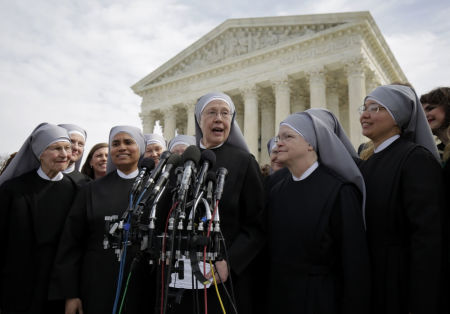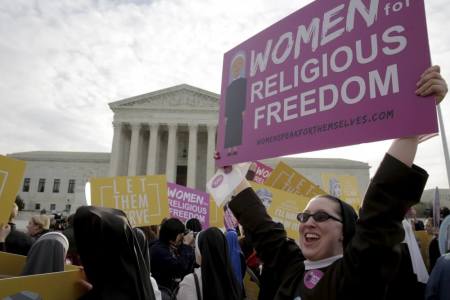Supreme Court Decision Affirms God Always Protects the Little Sisters of the Poor, Sister Constance Says

The Little Sisters of the Poor, a Catholic order of nuns in the midst of a lawsuit against Obamacare's birth control mandate, are encouraged and optimistic following the United States Supreme Court's decision to vacate lower court rulings.
The high court unanimously decided on Monday to send the case brought by Little Sisters and 36 other religious non-profits (Zubik v. Burwell) against the Department of Health and Human Services Affordable Care Act mandate back to appeals courts, and also vacated an appeals court judgement that ruled that the Little Sisters had to allow the federal government to provide its employees birth control and abortifacients through the organization's health plan.
As the Supreme Court called on the courts and administration to "arrive at an approach going forward that accommodates petitioners' religious exercise," Little Sisters of the Poor's U.S. director of communications Sister Constance Veit told The Christian Post Tuesday that the court's decision affirms the fact that God has always been there to protect the sisters, no matter what sociopolitical conditions faced them.
"Basically, the Supreme Court has recognized what we have always been insisting, which is that the government could be achieving their goals relative to these services without involving us," Veit explained. "The Supreme Court basically told the federal government that they need to find a way to resolve this by accommodating our religious beliefs and our concerns."
"This wasn't a shock," Veit said of the court's decision. "All along, we have made the intentional choice to put our trust in God because we have been around for 175 years, all over the world in a lot of precarious situations, through social and political upheaval, and God has always protected our sisters. This is just an affirmation of that. We know that he is going to work this out for us."
Although no court dates have yet been set, the Little Sisters are confident moving forward and believe that the end of their legal battle is near.
"We are feeling very encouraged and very hopeful because we have realized that this is not the end of the game but it is much closer to the end," Veit stated. "We have been optimistic and hopeful all along, just because we trust that God is going to take care of this for us and we also have great trust and admiration in our legal team at Becket Fund. Yesterday, for me, was a confirmation that 'Okay, God really is protecting us in all of this.'"
Veit explained that the reason for her confidence is the fact that the Obama administration even admitted in its supplemental brief submitted to the Supreme Court in April by Solicitor General Donald Verrilli that the administration could have accomplished its contraceptive goals without infringing on the nuns' religious beliefs.

Maureen Ferguson, senior policy advisor at The Catholic Association, told CP that the court's decision "portends a big victory" for two reasons.
"The court told the government that it can't fine the Little Sisters and these other charities and hospitals and educational institutions," Ferguson explained. "The court also effectively overturned the decision that ruled against the Little Sisters and said, 'Reconsider these cases based on the supplemental briefings,' in which the government admitted that they really don't need to hijack the Little Sisters' health care plan in order to reach their goal."
Veit added that the government's position in the case represents the growing misconception in "dominant culture" that freedom of religion merely means "freedom of worship."
"Freedom of religion goes much further than that because anyone's faith informs their daily decision and their living," Veit said. "That is how it goes further and that is the area where [the administration] seems to want to restrict religious liberty."
As many secularists like to rely on the term "separation of church and state" when trying to limit the impact of religious groups in the public square, Veit stressed that the term was never in the Constitution.
"The First Amendment was never meant to keep religion out of the public square, it was to keep the government out of overly controlling of religions and faith groups and not establishing an official church," she asserted. "It was really to protect religious practice, not suppress it. The 'church and state' expression grew to mean that religion has no place in the public square and that is just not true."





















